On Feb. 21, the Japanese Bitcoin Exchange Mt. Gox announced it was ceasing operations, leaving investors and traders wondering what happened to the 750,000 Bitcoins they owned (not to mention the addition 100,000 Bitcoins Mt. Gox itself controlled). The loss totaled approximately $480 million (at the exchange rate immediately prior to the collapse). A week later the exchange filed for bankruptcy.
Although other Bitcoin exchanges around the world continue to operate normally, the failure of Mt. Gox has rattled the Bitcoin world and cast a shadow over the viability, security and practicality of the currency itself. Time will tell whether the collapse and bankruptcy will have a long-term impact on the use of Bitcoins, or whether other exchanges, including one to be established by SecondMarket, will ease investor fears. If other exchanges can bring stability to Bitcoin trading, its use by mainstream businesses will continue to grow.
This content has been archived. It is available through our partners, LexisNexis® and Bloomberg Law.
To view this content, please continue to their sites.
Not a Lexis Subscriber?
Subscribe Now
Not a Bloomberg Law Subscriber?
Subscribe Now
LexisNexis® and Bloomberg Law are third party online distributors of the broad collection of current and archived versions of ALM's legal news publications. LexisNexis® and Bloomberg Law customers are able to access and use ALM's content, including content from the National Law Journal, The American Lawyer, Legaltech News, The New York Law Journal, and Corporate Counsel, as well as other sources of legal information.
For questions call 1-877-256-2472 or contact us at [email protected]






